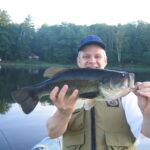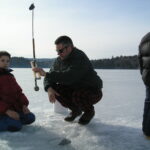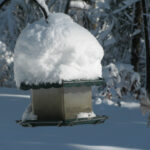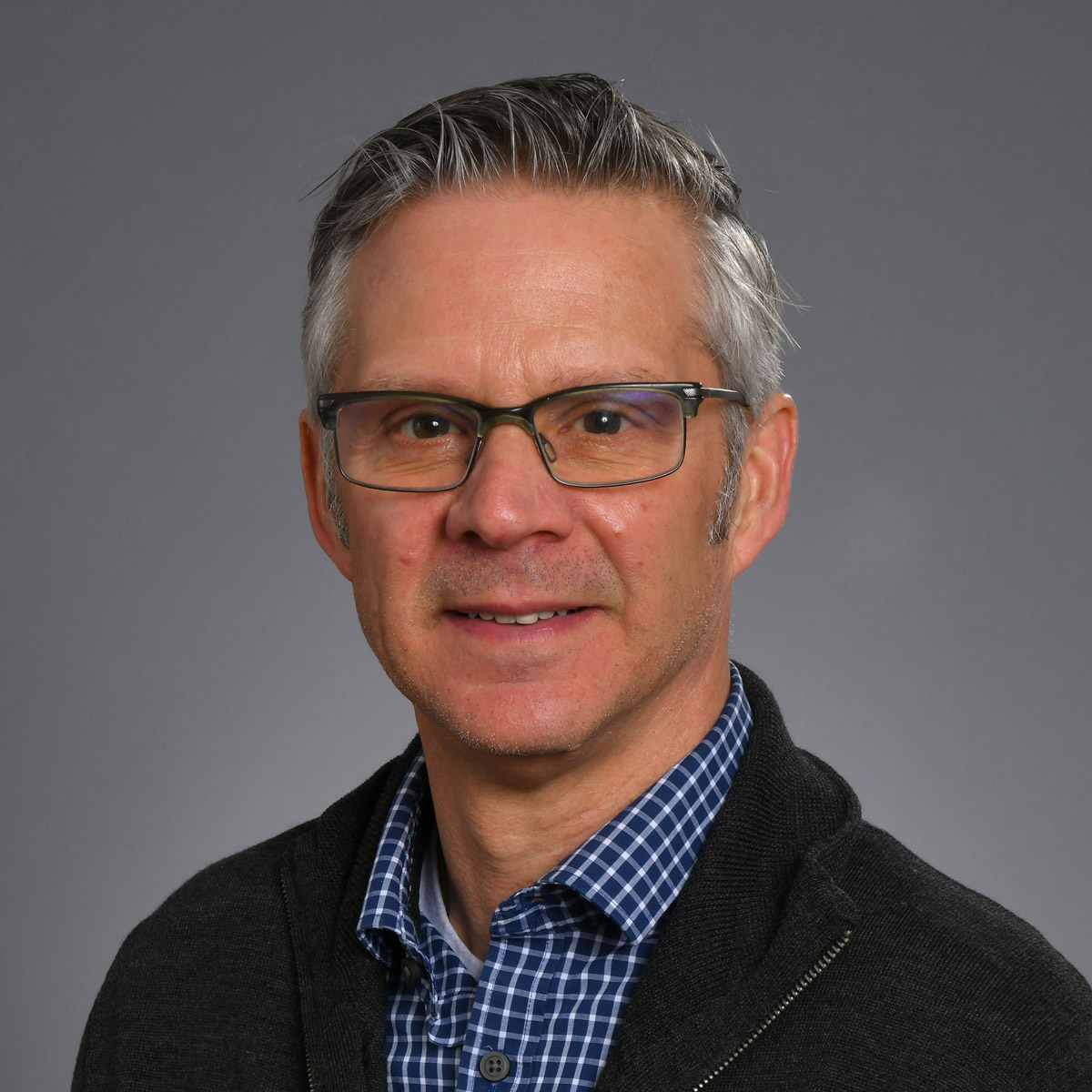Professor of Computer Science
Education
Ph.D. and M.S., University of New Hampshire
B.A., University of Maine
About
Main Interests
Build. Working with students to build for others, including tools for searching literature, 3D capture of WWI cave etchings in France, and working together like a start-up.
Other Interests
Camp in Maine.
Bass fishing … calm water.
Bird watching … landscaping.
Building field stone walls.



Reading biographies of each President in order: My longer-term project finds me reading biographies of the United States Presidents … in order. In 2011, I was to the point where I was finally reading biographies of Presidents that were in office after I was born. As of August 2011, I had finished up Dallek’s excellent biography of JFK (highly recommended; the first biographer to have access to the complete medical records of JFK) … and then (May 2012) finished Dallek’s biography of Lyndon Johnson: Flawed Giant: Lyndon Johnson and His Times, 1961-1973 (just a wonderful read; almost as good as McCullough’s Truman). By August 2016, I’d finished reading Nixon and Kissenger by Dallek and biographies of Ford and Carter. I had to stop reading a biography of Reagan (March 2018); I liked reliving my mid-1980 days of working in the Mojave desert on SDI and drones, but I needed a break from the Reagan Administration. The Norton Public Library men’s reading book group has been a healthy digression (e.g., I read Chernow’s new work on Grant; enjoyed it greatly with my morning oatmeal). As of July 2021, I’m stuck on this reading project (but, please, ask me how I’m doing 🙂 )
Paris, Château-Thierry, Braye-en-Laonnois, France (2015, August 2019, and July 2021)
Reykjavik, Iceland (July 2015)
Ireland (July-Aug, 2013): Dublin | Ballyconneely
China (April 2012): The Great Wall | The Forbidden City | Terra Cotta Warriors | Peking Duck Dinner
A year “down undah” …
Publications
Link to Vitae (as of September 2019)
Books
LeBlanc, M.D. and LeBlanc, J.M. (2018). From Maine to France and Somehow Back Again: WWI Experiences of John M. Longley and the 26th ‘Yankee’ Division. Lulu Publishing. [eBook and print]
LeBlanc, M.D. and Dyer, B.D. (2007). Perl for Exploring DNA. (Oxford University Press).
Articles
Feng, W. ’19 and LeBlanc, M.D. (2019). Top-10 Suggestions from a Decade of Managing Undergraduate Software Teams. The Journal of Computing Sciences in College, v34(6), 70-83.
Zhang, C. ’18, Feng, W. ’19, Steffens, E. ’18, de Landaluce, A. ’17, Kleinman, S. and LeBlanc, M.D. (2018). Lexos 2017: Building Reliable Software in Python. The Journal of Computing Sciences in Colleges, v33(6), 124-134.
LeBlanc, M.D. (2018). Toward Reproducibility in DH Experiments: A Case Study in Search of Edgar Allan Poe’s First Published Work. Short paper presented at Digital Humanities 2017, Montreal, Canada, August 2017.
Boese, E.S., LeBlanc, M.D., and Quinn, B.A. (2017). EngageCSEdu: Making interdisciplinary connections to engage students. ACM Inroads, v8(2), 33-36.
LeBlanc, M.D. (2016). Computing and the Digital Humanities. An NCWIT Teaching Paper: National Center for Women & Information Technology. Published accompanying sets of course materials for the “Computing for Poets” course.
LeBlanc, M.D. and Drout, M.D.C. (June 2015). “DNA and 普通話(Mandarin): Bringing introductory programming to the Life Sciences and Digital Humanities”, International Conference on Computational Science , Reykjavik, Iceland, June 1-3, 2015.
Boyd, P., Drout, M.D.C., Hitotsubashi, N., Kahn, M., LeBlanc, M.D. and Smith, L. (2014). “Lexomic Analysis of Anglo-Saxon Prose: Establishing Controls with the Old English Penitential and the Old English translation of Orosius.” Revista de la Sociedad Española de Lengua y Literatura Inglesa Medieval (SELIM) 19, 7-58.
LeBlanc, M.D., Drout, M.D.C., Kahn, M., Herbert, A. ’14, Neal, R. ’14 (2013). “Lexomics: Integrating the research and teaching spaces.” Short paper at Digital Humanities 2013, University of Nebraska–Lincoln, 16-19 July 2013.
Downey, S.J., Drout, M.D.C., Kahn, M., and LeBlanc, M.D. (2012). ‘Books Tell Us:’ Lexomic and Traditional Evidence for the Sources of Guthlac A. Modern Philology. 110 (2012): 1-29.
Drout, M.D.C., M. J. Kahn, M.D. LeBlanc, and Nelson, C. ’11 (2011). Of Dendrogrammatology: Lexomic Methods for Analyzing the Relationships Among Old English Poems. Journal of English and Germanic Philology, July 2011, 301-336.
Drout, M., Kahn, M., LeBlanc, M.D., Jones, A. ’11, Kathok, N. ’10, and Nelson, C. ’11 (2010). Lexomics for Anglo-Saxon Literature. Old English Newsletter.
Maloney, M., Parker, J., LeBlanc, M.D., Woodard, C.T., Glackin, M., and Hanrahan, M. (2010). Bioinformatics and the Undergraduate Curriculum. CBE Life Sci Educ: 172-174.
LeBlanc, M.D., Gousie, M. and Armstrong, T. (March 2010). Connecting Across Campus. Proceedings of the 41st SIGCSE Technical Symposium on Computer Science Education, Milwaukee, WI.
Dyer, B.D., Kahn, M.J., and LeBlanc, M.D. (2007). Classification and Regression Tree (CART) analyses of genomic signatures reveal sets of tetramers that discriminate temperature optima of Archaea and Bacteria. Archaea 2:159-167.
LeBlanc, M.D. and Leibowitz, R. (2006). Discrete Partnership — A case for a full-year of Discrete Math. Proceedings of 37th SIGCSE Technical Symposium on Computer Science Education, Houston, TX, 313-317.
LeBlanc, M.D. and Dyer, B.D. (2004). Bioinformatics and Computing Curricula 2001 — Why Computer Science is well positioned in a post-genomic world. ACM SIGCSE Bulletin, v36(4), Dec. 2004, 64-67.
Russell, S.W. and LeBlanc, M. (2004). Learning By Seeing By Doing: Arithmetic Word Problems. With Sylvia Weber-Russell (UNH). The Journal of the Learning Sciences, v13(2), 197-220.
Dyer, B.D., LeBlanc, M.D., Benz, S., Cahalan, P., Donorfio, B., Sagui, P., Villa, A., and Williams, G. (2004). A DNA motif lexicon: cataloguing and annotating sequences. In Silico Biology, vol. 4, no. 4, pp. 471-478. https://www.ncbi.nlm.nih.gov/pubmed/15506996
Grants and Workshops
Grants
Warfield, H. and LeBlanc, M.D. (2021-2022). The New Hampshire Humanities (NHH). “Co-creating a WWI Yankee Division Virtual Pilgrimage.”
Boylan, K. and LeBlanc, M.D. (January 01 – December 31, 2019). Council of Independent Colleges (CIC). “MyShelf: Workflows for curating and sharing digital scholarship on JSTOR Forum”.
LeBlanc, M.D. (PI), Drout, M., and Kleinman, S. (July 2015 – June 2017). National Endowment for the Humanities – NEH (Digital Humanities Start-Up Grant) — Easing Entry and Improving Access to Computer-Assisted Text Analysis for the Humanities.
Drout, M. (PI), Kahn, M. (Co-PI), and LeBlanc, M.D. (Co-PI) [April 01, 2011 – March 30, 2013].National Endowment for the Humanities – NEH PR-50112011 – Lexomic Tools and Methods for Textual Analysis: Providing Deep Access to Digitized Texts.
LeBlanc, M. (PI), Drout, M. and Kahn, M. (July 2008 – June 2010). National Endowment for the Humanities NEH HD-50300-08 — Pattern Recognition through Computational Stylistics: Old English and Beyond.
LeBlanc, M. and Dyer B. (May 2004 – May 2007). Two-year NSF grant: DUE-0340761 Teaching Genomics to Undergraduate Computer Science and Biology Majors: A model involving infusion and strategic linking. See Sample Educational Materials.
Workshops and Talks
Exploring Digitized Texts in the Humanities at The New England Digital Connections Digital Humanities Island Retreat, Appledore Island, Isle of Shoals, Maine in August 2019 (with K. Boylan, Wheaton College).
Experiments in Digital Scholarship: Project-Based Learning at Wheaton College at Susquehanna University in Selinsgrove, PA on March 2018 at their Center for Teaching and Learning.
Introducing Students to Explorations of Digitized Texts, Bucknell University Digital Scholarship Conference 2017, Oct. 6-8 2017.
Bringing Computational Thinking to the Digital Humanities: Introducing Students to Explorations of Digitized Texts, CCSCNE 2017 the College of Saint Rose, Albany, NY, April 7, 2017.
Using Lexos to Explore your Digital Texts, NEMLA 2017, Baltimore, MD, March 23, 2017.
Lexos: Easing Entry to Computational Studies with Digitized Texts, Coffee and Code Series, Boston College Libraries, O’Neill Library, Digital Studio March 20, 2017.
Drout, M.D.C., LeBlanc, M.D., Neal, R. ’14, Berger, R. ’14, Hitotsubashi, N. ’13, Smith, L. ’14. (2013). Graduate Workshop: Using Lexomics Tools. Presented at the International Society of Anglo-Saxonists (ISAS 2013), Dublin, Ireland, July 28, 2013.
Classifying Stages of Retention and Loss of DNA Acquired by Horizontal Transfer between Bacteria and Archaea. Experimental work performed in conjunction with Emily Baldwin ‘13, Kelsey Hichens ‘13, Michael Kahn, and Betsey D. Dyer. Abstract published in the proceedings of and work presented at World DNA Day, Xi’an, China, April 26, 2012.
Lexomics Methods – Presented at The 47th International Congress on Medieval Studies, Kalamazoo, MI, May 10, 2012.
Perl for Biologists. Howard Hughes funded workshop for retaining students in science. Hampton College, VA. July 2010, 2011, and 2012.
Computer Science @Home: Programming with Alice Animation. Presented at the Massachusetts Home School Convention. Worcester, MA, April 30, 2011.
Bioinformatics in the computer science curriculum. Panel presentation at CCSCNE 2011 — Conference for Computing in Small Colleges. Western New England College, Springfield, MA, April 16, 2011.
Recruiting via a First-Year Seminar: Storytelling Through Computer Animation. Presented at SIGCSE 2011 — The Technical Symposium on Computer Science Education, Dallas, TX, March 11, 2011.
Connecting Across Campus. Presented at SIGCSE 2010 — The Technical Symposium on Computer Science Education, Milwaukee, WI, March 11, 2010.
Computing for Poets. Presented at SIGCSE 2010 — The Technical Symposium on Computer Science Education, Milwaukee, WI, March 12, 2010.
medPing: Data Structures with Embedded Medical Devices. Presented at CCSCNE 2010 — Conference for Computing in Small Colleges. Hartford, CT, April 16, 2010.
Computer Science @Home: Programming with Alice Animation. Presented at the Massachusetts Home School Convention. Worcester, MA, April 24, 2010.
Fishing for patterns in a sea of texts: Lexomics for Anglo-Saxon Literature. Presented at the International Society of Anglo-Saxonists (with M. Drout, M. Kahn, and C. Nelson ’11) at St. John, Newfoundland, Canada, July 25, 2009.
Palindromes in DNA Land. Presented at ‘DNA and Health: Education, Community and Business Perspectives’ (with B. Dyer) at the Center for the Advancement of Science Exploration, Bridgewater State College, February 5, 2009.
Alice in High School Land. Presented a hands-on introduction to the Alice programming environment to computing and mathematics teachers at Norton Public High School, Norton, MA, February 1, 2009.
Extremophiles and Spider Webs: Adventures in Genomics. Presented at ‘Bringing Big Science to Small Schools: Genomics Curriculum Development Workshop’ (with B. Dyer) at Vassar College, July 22, 2007.
Teaching Interests
Interdisciplinary Teaching in Genomics
CS and Biology — “Linking” courses, team-teaching
DNA — Teaching programming, personalized medicine, and the richness in the human microbiome projects
Reaching out to the (Digital) Humanities
Computing for Poets — RegEx, Python, Anglo-Saxon Corpus, and Tolkien
Student Projects
Recent Student Publications and Presentations
Feng, W. ’19 and LeBlanc, M.D. (2019). Top-10 Suggestions from a Decade of Managing Undergraduate Software Teams. The Journal of Computing Sciences in College, v34(6), 70-83. Also presented at the Consortium for Computing Sciences in Colleges, University of New Haven, CT, April 12, 2019.
Zhang, C. ’18, Feng, W. ’19, Steffens, E. ’18, de Landaluce, A. ’17, Kleinman, S. and LeBlanc, M.D. (2018). Lexos 2017: Building Reliable Software in Python. The Journal of Computing Sciences in Colleges, v33(6), 124-134. Also presented at the Northeast region of the Consortium for Computing Sciences in Colleges (CCSCNE 2018), Manchester, NH, April 13, 2018.
Devin Delfino ’14, Bryan Jensen ’15, Mengyang Li ’14, Julia Morneau ’16, and Richard Neal ’14. Lexos: A Text Mining Workflow. Poster presentation at the Northeast region of the Consortium for Computing Sciences in Colleges (CCSCNE 2014), Providence College, Providence, RI, April 25, 2014. This work won 3rd place for best research.
Tongbo Sui ’14. Graphical Visualization of Eye-Tracking Data. Poster presentation at the Northeast region of the Consortium for Computing Sciences in Colleges (CCSCNE 2014), Providence College, Providence, RI, April 25, 2014. Co-advised with Jason E. Reiss, Psychology, Wheaton College.
Taylor Wright-Sanson ’13, Richard Neal ’14, Clayton Rieck ’14, Tri Nguyen ’14, and Anthony Castellani ’13. cowDuck: An iPhone App for the Wheaton College Community. Poster presentation at the Northeast region of the Consortium for Computing Sciences in Colleges (CCSCNE 2013), Siena College, Loudonville, NY, April 12, 2013. This work won 3rd place for best research.
Richard Neal ’14. hyperCutter: Combining Discrete Lexomics Tools. Poster presentation at the Northeast region of the Consortium for Computing Sciences in Colleges (CCSCNE 2013), Siena College, Loudonville, NY, April 12, 2013.
Taylor Wright-Sanson ’13. Circus Smirkus v1.0. Poster presentation at the Northeast region of the Consortium for Computing Sciences in Colleges (CCSCNE 2013), Siena College, Loudonville, NY, April 12, 2013.
Kelsey Hichens ’13 and Emily Baldwin ’13. The Double Helix of Computer Science and Biology: Horizontal Transfer in Archaea and Bacteria Genomes. Poster presentation at the Northeastern Consortium for Computing Sciences in Colleges (CCSCNE 2012), Quinnipiac University, Hamden, CT, April 27, 2012.
Jones, Amos ’11. diviText: Graphical and Automated Text Segmentation for Text Mining. Poster presentation at the Northeastern Consortium for Computing Sciences in Colleges, Western New England College, April 15, 2011.
Drout, M.D.C., M. J. Kahn, M.D. LeBlanc, and Nelson, C. ’11. Of Dendrogrammatology: Lexomic Methods for Analyzing the Relationships Among Old English Poems. Journal of English and Germanic Philology, July 2011, 301-336.
Drout, M., Kahn, M., LeBlanc, M.D., Jones, A. ’11, Kathok, N. ’10, and Nelson, C. ’11 (2010). Lexomics for Anglo-Saxon Literature. Old English Newsletter.
Student Software for Anglo-Saxon Scholarship
Pattern Recognition through Computational Stylistics: Old English and Beyond.
Student Software in Genomics
Building tools for scientists …
Honors Theses
Cluster Validation Using the Non-parametric Bootstrap and Parallel Processing: Applications in Unsupervised Machine Learning of Shimodaira’s Method to Text Mining and Genomics. Donald Bass, May 2012. Co-advisor with Mike Kahn, Statistics.
diviText: Visualizing Text Segmentation for Text Mining. Amos Jones ’11.
The Politics of Free: Open Source Software in Government. Brian Donorfio ’04
Supporting Analyses of Gene Regulation in DNA Neighborhoods. Adam Villa ’03
Search Algorithms for Locating Potential Regulatory Motifs in the Promotors of the Kreb’s Cycle Genes of Caenorhabditis elegans.
Glen Aspeslagh ’00
Utilizing a Genetic Algorithm to Search the Structure-space of Artificial Neural Networks for Optimal Architectures.
Ken Aspeslagh ’00
Service Learning
New database for information on 5000+ slides.
Norton Historical Society web page
Town of Norton prototype
Research Interests
Our Lexomics group, an interdisciplinary research team from faculty and students in Computer Science and English continues development of our text mining tool Lexos. The rapid digitization of texts presents both new opportunities and real barriers of entry to computer-assisted explorations of texts. Lexos provides a simple, web-based workflow for text processing, statistical analysis, and visualization designed to address these barriers. The project supports Lexos’ core strength as an entry-level tool while seeking to position it as an innovative intervention in Digital Humanities conversations about the interplay of machine learning and text analysis.
In 2018, I published a book (print and eBook) with my brother John about our maternal grandfather’s experiences while fighting in France during WWI: From Maine to France and Somehow Back Again: WWI Experiences of John M. Longley and the 26th ‘Yankee’ Division.
In August 2019 and again in July 2021 in the Chemin des Dames region in France, I “splunked” down 30’ and led a team to 3D-capture etchings left by New England soldiers during WWI.
The Genomics Group was an interdisciplinary team of faculty and students studying the DNA of various microbial organisms. Working in conjunction with faculty involved in the Bioinformatics major, students and faculty continue to do research using the glut of microbial and other genomes, e.g., work with data from Next-Gen sequencing of the microbial communities found in the guts of isopods.
